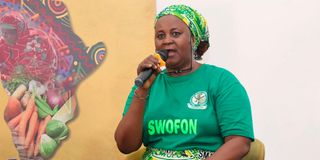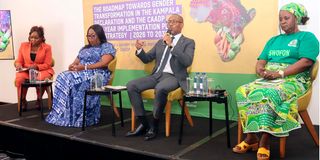Mary Afan's personal struggle that ignited Africa's movement for women's land ownership

African Kilimanjaro Women Farmers Forum (AkiWOFF) member Mary Afan speaks during the launch of the Comprehensive Africa Agriculture Development Program Gender Influencing brief at Trademark Hotel in Nairobi on March 19, 2025.
What you need to know:
- Mary Afan, denied inheritance to her father's land by her brothers, transformed personal injustice into a continent-wide movement by leading 400 women farmers up Mt Kilimanjaro.
- Their historic seven-day climb became a powerful symbol of resistance against laws that prevent African women from owning land, despite these women producing up to 80 per cent of the continent's food.
The wind whipped against their faces as they climbed, step by determined step, up the harsh slopes of Mount Kilimanjaro. Battling cold and fatigue, Mary Afan and 400 women farmers from 22 African countries pressed forward with a singular purpose. Their expedition wasn't merely about conquering Africa's highest peak – it was about planting a flag for millions of voiceless women across the continent who continue to be denied their right to own land.
"The journey up and down the mountain was tough and marked by cold episodes. We, however, had to soldier on to make our voices heard," recalls Mary, the president of the Small-Scale Women Farmers' Organisation in Nigeria.
This historic seven-day trek in October 2016, represented the culmination of years of grassroots organising and symbolised the uphill battle women face in securing land rights across Africa. Upon descending the mountain, the women presented a petition to the African Union (AU) detailing the struggles women on the continent undergo to own land, marking what would become the largest ever rural women's land rights assembly.
For Mary, this fight is deeply personal. When her father died, she did not expect to face problems accessing her inheritance. But shock and disbelief followed when her three brothers refused to share their father's land with Mary and her five sisters.
"If you don't have the right to land, it's like you do not have life," Mary explains during an interview with Nation.Africa in Nairobi, where she was attending the launch of the Comprehensive Africa Agriculture Development Program (CAADP) Gender Influencing Brief.
"Owning land will help women walk into economic freedom as they can do farming on it. Women want to have control of land so that they can do whatever they want with it to develop themselves."
The mountaineering protest wasn't born in a vacuum. It emerged from Mary's painful personal experience that transformed her into an activist determined to fight for women's land rights. Starting locally, she mobilised other women farmers in her community who faced similar predicaments. Their movement gradually expanded from the local level to the state level and eventually established a presence nationally.
"We wanted to draw the attention of governments to compel them to change policies and laws that continue to stop women from owning and inheriting land on the continent. Lack of land rights is affecting women and needs to be tackled," Mary says.
The women's demands included calling on African governments to ensure women enjoy the same land rights as men and to make inheritance easier for women and girls. Their activism didn't stop at Kilimanjaro. In March 2017, they took their demands to the UN Commission on the Status of Women, the world's largest platform for women's rights issues held yearly at the UN headquarters in New York. There, they addressed representatives of African governments and farmers' associations, discussing their community-level work to defend women's land rights and break down barriers to women's access to land and resources.
The injustice is particularly stark given women's critical role in African agriculture. In rural Africa, smallholder farmers – the majority of whom are women – produce about 80 percent of the continent's food. From sowing, weeding, and fertilising to processing and transporting, these women form the backbone of Africa's food security and production industry.

From left: Oxfam's Wanjiku Wanjohi, ActionAid's Constance Okeke, African Food System Parliamentary Network Secretary General Jeremy Lissouba and AkiWOFF member Mary Afan during the launch of the Comprehensive Africa Agriculture Development Program Gender Influencing brief at Trademark Hotel in Nairobi on March 19, 2025.
According to UN Women, women produce between 70 and 80 per cent of the food in Africa, yet own less than 10 per cent of the land. Globally, less than one in five landholders are women, despite women comprising nearly half of the world's agricultural workforce and producing up to 80 percent of food in developing countries.
The consequences can be devastating, particularly for widows. When women lose their husbands, they often suffer eviction at the hands of their in-laws, left with nowhere to go and no land from which to generate income to feed their children. Women's rights to inherit their husbands' property continue to be denied in more than 100 countries.
A roadmap for change
To address these persistent inequalities, several organisations are leading initiatives to enhance women's land rights. Oxfam, African Women's Development and Communications Network, SDG2 Advocacy Hub, African Kilimanjaro Women Farmers Forum, and ActionAid recently launched the Gender Influencing Brief in Nairobi to advance the gender agenda in Africa's food systems.
This brief forms part of the Roadmap Towards Gender-Transformation in Africa's New Agri-Food System Strategy (2026–35), a framework that proposes gender-sensitive measurable indicators and policy steps. The roadmap ensures women's participation in decision-making and access to and control of productive resources while recognising the intersectional and cultural challenges that plague women in agriculture.
"It's shameful that progress remains so slow in addressing the discrimination women face in Africa's agri-food system, while policies have for long acknowledged these inequalities and recognised women's critical contribution to food security," says Fati N'Zi-Hassane, director at Oxfam in Africa. "This roadmap provides a clear, actionable plan to ensure smallholder women farmers and other marginalised groups are at the heart of the continent's agricultural transformation."
The framework advocates the inclusion of measurable gender-focused indicators that will allow policymakers to assess the impact of their work on women's education, technology access, cultural barriers, decision-making, access to resources, and participation in agricultural activities. It also underscores the need for CAADP to align with the continent's vision for gender equality by providing recommendations to strengthen CAADP's alignment with the Maputo Protocol.
Susan Otieno, Executive Director of ActionAid Kenya, emphasises that "Sustainable agricultural growth is not just about increasing yields; it's about empowering communities, enhancing resilience, and ensuring that no one is left behind. The CAADP framework offers a transformative path that connects vision with action, guiding Africa towards food security and prosperity."
A food security crisis
The urgency for change is underscored by Africa's current food security crisis, driven by low investment in agriculture, climate shocks like drought and floods, conflict, and unfavourable land policies that disadvantage women smallholder farmers. Some 163 million people in Africa faced acute food insecurity in 2024.
To realise full gender equality, the AU Agenda 2063 recommends that 20 per cent of rural women have access to and control of land by 2023 – a target that remains far from achieved.
In Kenya, despite the Constitution and land legislation providing a robust framework for protecting women's land rights, only one to two percent of women have registered titles to land. The majority continue to access land through male relatives – fathers, husbands, sons, and other male family members.
For Mary, there are encouraging signs of change. "Things are much better now and more women now own land," she notes of the situation in Nigeria. "I, for example, now own two acres where I do farming. Having a space where we can freely talk and agitate for land rights is also a positive step."
The Kilimanjaro Initiative, as the climb came to be known, continues to inspire women across Africa to advocate for their land rights. It symbolises the heights women are willing to climb to secure their economic freedom and self-determination.





